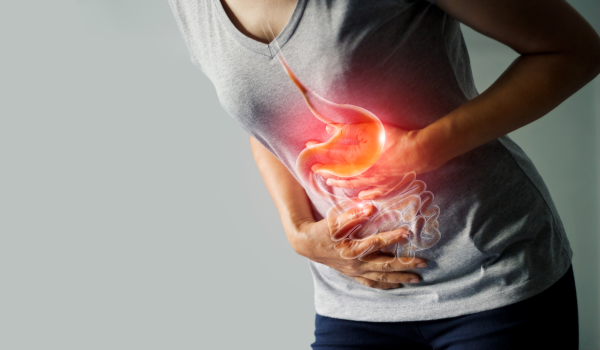Clinical study on the
Diabetic or idiopathic gastroparesis/ gastric emptying disorder
Do you have an excessive feeling of fullness after eating? Do you suffer from nausea, vomiting, abdominal pain, and loss of appetite?
We are looking for patients between the ages of 18 and 75 with diabetic or idiopathic gastroparesis/stomach emptying disorder for a clinical study.
Contact us.

Possible symptoms and consequences of gastroparesis:
- Feeling of fullness after eating
- Nausea
- Vomiting
- Upper abdominal pain
- Flatulence
- Weight loss
What is gastroparesis?
It is a stomach disease in which food is digested more slowly than normal. In a healthy digestive system, powerful muscle contractions transport the food bolus from the stomach further through the intestinal tract. In gastroparesis, the muscles work more slowly or no longer work at all and as a result, the stomach cannot adequately empty.
Diabetic gastroparesis: Diabetic gastroparesis is a complication of diabetes mellitus.
Idiopathic gastroparesis: IIdiopathic gastroparesis is defined as gastroparesis without an identifiable cause. This means that it is not the result of existing diseases.
Treatment and more
Important info
Treatment
You will be randomly assigned to one of the four treatment groups. Three treatment groups receive tablets with an active substance at different dosages. The fourth group receives placebo (tablets without active substance).
Time required
Maximum length of treatment per patient: approx. 12 weeks.
Aim of the study
In this study, the efficacy of the investigational preparation (film-coated tablet) as compared to placebo is to be investigated during a 12-week treatment phase. In addition, the optimal dosage, safety, and tolerability will be evaluated.
You will be randomly assigned to one of the four treatment groups. Three treatment groups receive tablets with an active substance at different dosages. The fourth group receives placebo (tablets without active substance).
Maximum length of treatment per patient: approx. 12 weeks.
In this study, the efficacy of the investigational preparation (film-coated tablet) as compared to placebo is to be investigated during a 12-week treatment phase. In addition, the optimal dosage, safety, and tolerability will be evaluated.
Clinical study: gastroparesis
Participation criteria for the study
Check here whether you could be suitable for the gastroparesis study. Do these criteria apply to you? If so, you may be eligible for our clinical trial.
Who can participate in the study?
Who can participate in the study?
Men and women between 18-75 years of age with symptoms of idiopathic or diabetic gastroparesis (e.g. nausea, vomiting, early satiety, etc.) within the past 3 months.
Who cannot participate in this study?
Who cannot participate in this study?
Persons who
- Have a history of gastrointestinal procedures, such as gastric bypass, anti-reflux surgery, etc.
- Have abnormal kidney or liver function
- Have a known eating disorder
- Have a past history of more than one minor stroke or coronary heart disease
- Suffer from gastroparesis due to other diseases, such as Parkinson’s, cancer, connective tissue diseases, etc.
- Are pregnant or who are planning a pregnancy
Clinical study: gastroparesis
How to participate in the study
Enter your postcode here and search for your nearest study center:
FAQ Clinical Studies
Frequently asked questions
A clinical trial is "any investigation involving human subjects", that tests new medical treatmentsdrugs or therapies to determine their safety and efficacy.
Clinical trials are crucial for the development and validation of new medical approaches, to enable advances in healthcare and improve existing treatments.
Clinical trials are conducted not only in hospitals, but also by physicians in private practice. Pharmaceutical companies are often the clients of such studies, but universities or hospitals can also initiate such studies. An educational interview will be conducted prior to potential participation. Here you will be informed about goals, methods, advantages and possible risks. After sufficient time to think about it, you can decide whether you want to participate in the clinical trial. Participation is always voluntary and can be terminated at any time without giving reasons. The initial consultation will be followed by the screening visit, during which your eligibility for the study will be assessed. If the assessment is positive, the baseline visit occurs, in which baseline values are recorded and then the study medication or a placebo is administered. During the treatment phase, regular visits are scheduled to monitor your health, the effectiveness of the medication, and any side effects. After the treatment phase, there is a follow-up phase to evaluate the long-term effects and safety of the medication.
Yes, the safety of the participants is a top priority. Clinical trials are carefully planned and monitored to minimize potential risks. Prior to participation, researchers must disclose all risks and potential benefits of a study, and participation is always on a voluntary basis.

